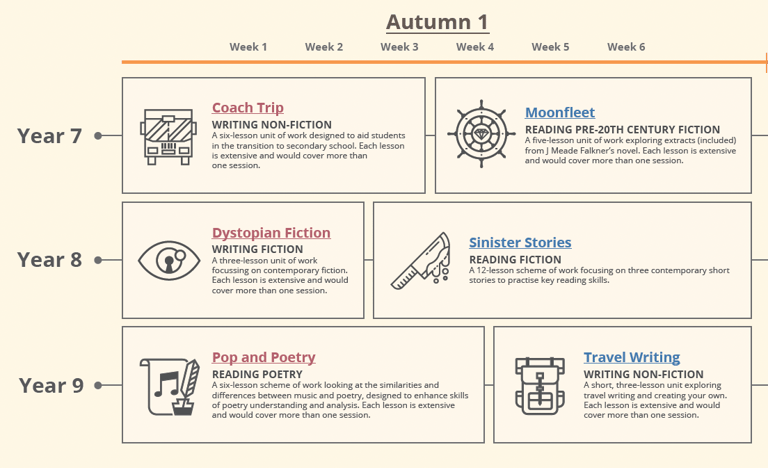
Secondary Education
Years 7-9. Our courses break down into particular units or can be separated into areas of specific improvement.
Click to learn more about each course.

On route to success...
What is KS3?
In the UK education system, KS3 stands for Key Stage 3, which is a phase of education typically covering students aged 11 to 14. KS3 follows Key Stage 2 (KS2) and precedes Key Stage 4 (KS4). During KS3, students continue their secondary education, building on the foundational knowledge and skills acquired during KS2.
How do we structure our classes?
Here is an example of our curriculum to help aid your child's secondary education in preparation for year 10-11.


Classes are split into different units of study and take varied lessons to complete depending on your frequency of classes. Depending on the student's areas of needed improvement, depends where you may begin if you start later into the term.
In terms of English at KS3, students expand and deepen their understanding of the language, literature, and communication skills. The key components of English education during this stage include:
English Literature: Students study a range of literary texts, including novels, plays, poetry, and non-fiction. They develop their ability to analyze texts, explore themes, understand literary devices, and form their own interpretations.
Creative Writing: Creative writing is encouraged and refined. Students have opportunities to express their creativity through various forms of writing, such as short stories, poetry, and creative essays.
Non-fiction Writing: Students learn to write different types of non-fiction texts, including reports, persuasive essays, and critical reviews. They work on structuring their writing effectively and using evidence to support their arguments.
Grammar and Punctuation: There is a continued emphasis on improving grammar and punctuation skills to enhance written communication.
Speaking and Listening: Students continue to develop their speaking and listening skills. They engage in group discussions, debates, presentations, and other forms of oral communication to build their confidence and fluency.
Comprehension: Advanced comprehension skills are taught, enabling students to critically analyze texts, infer meanings, and evaluate arguments effectively.
Shakespeare and Classical Literature: Many students study the works of William Shakespeare and classical literature during KS3, providing a foundation for more in-depth study at GCSE (Key Stage 4).
What to expect...




The ultimate goal of KS3 in the UK education system is to provide students with a well-rounded and advanced understanding of English language and literature.
This preparation is crucial as they move into KS4 and begin their General Certificate of Secondary Education (GCSE) courses, which are the standardized examinations taken at age 16. KS3 serves as a transition period that equips students with the skills and knowledge they need to excel in their later academic pursuits.


What We do
Who WE ARE
Subscribe to our newsletter
Educational Camps


